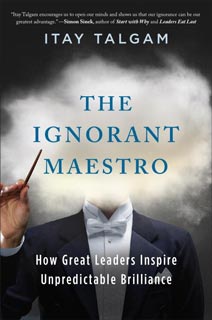The Ignorant Maestro
May 19, 2015
In The Ignorant Manifesto, Itay Talgam argues counterintuitively that the best thing a leader or manager can do is to embrace their own ignorance.
 In The Ignorant Maestro: How Great Leaders Inspire Unpredictable Brilliance (Portoflio; on sale May 19), famed classical conductor Itay Talgam explains how business leaders have much to learn from orchestras around the world, and the conductors who lead them. In a nutshell, he says that power is not a zero sum game, that perhaps the most powerful move of all is to eschew control and make way for creativity.
In The Ignorant Maestro: How Great Leaders Inspire Unpredictable Brilliance (Portoflio; on sale May 19), famed classical conductor Itay Talgam explains how business leaders have much to learn from orchestras around the world, and the conductors who lead them. In a nutshell, he says that power is not a zero sum game, that perhaps the most powerful move of all is to eschew control and make way for creativity.Talgam has spoken before organizations such as Goldman Sachs, Intel, and even national security agencies: not places you'd expect to find an abundance of classical music fans. But through workshops that feature clips of some of the 20th century's greatest composers, Talgam is able to engage everyone in the conversation about who would make the best leader in business, what the challenges are, and why.
In The Ignorant Maestro, inspired by his TED Talk, Talgam uses examples from his own conducting career interwoven with stories from his business world lectures to flesh out these ideas. He argues counterintuitively that the best thing a leader or manager can do is to embrace their own ignorance—it's the only way they will learn new things, and their employees and colleagues will learn to trust their own instincts. He also praises "gaps," the times when it's not definitively known what to do next. The events that follow such gaps can be beautiful, effective, or disastrous—but all outcomes offer valuable learning experiences.
At the heart of the book are Talgam's incisive diagnoses of six great composers, to explain how they succeeded and where they failed in their leadership styles. From there he extrapolates lessons that we can all use to become more mindful, valuable, and inclusive colleagues. The composers he discusses are:
- Command and Control: Riccardo Muti (a cautionary tale)
- The Godfather: Arturo Toscanini
- Play by the Book: Richard Strauss
- The Leader as Guru: Herbet von Karajan
- Leadership Dance: Carlos Kleiber
- In Search of Meaning: Leonard Bernstein
By learning how these legends created harmony and unity—while also encouraging individual artistry—we can all learn ways to hit the right notes in our working life. You can read more about Itay Talgam on his website.

